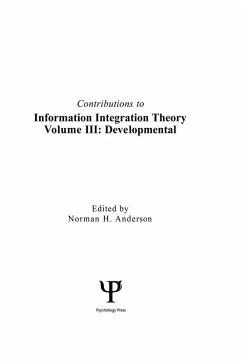
The Study of Temperament (eBook, PDF)
Changes, Continuities, and Challenges
Redaktion: Plomin, Robert; Dunn, Judy
Versandkostenfrei!
Sofort per Download lieferbar
52,95 €
inkl. MwSt.
Weitere Ausgaben:

PAYBACK Punkte
26 °P sammeln!
First Published in 1986. The modern history of temperament research began in the late 1950s with the New York Longitudinal Study. Twenty-five years later, temperament has become a major focus of research on early developing emotional and social traits. The impetus for this growth in temperament research stems from the merging of several shifts in child development research: from a view of the child as passive to a model of the child as an active, transacting partner with the environment; increasing interest in individual differences in development; an expansion of research on emotional and soc...
First Published in 1986. The modern history of temperament research began in the late 1950s with the New York Longitudinal Study. Twenty-five years later, temperament has become a major focus of research on early developing emotional and social traits. The impetus for this growth in temperament research stems from the merging of several shifts in child development research: from a view of the child as passive to a model of the child as an active, transacting partner with the environment; increasing interest in individual differences in development; an expansion of research on emotional and social development; and a clear change from an exclusive reliance on environmental explanations of developmental differences to a more balanced perspective that recognizes the possibility of biological as well as environmental influences. Most stimulating is the multidisciplinary flavor of temperament research-clinicians, infancy researchers, cultural anthropologists, and behavioral geneticists have, each for their own reasons, been drawn to the study of temperament. Each of these fields is represented in the present volume, which provides the first overview of the growing field of temperament.
Dieser Download kann aus rechtlichen Gründen nur mit Rechnungsadresse in A, B, BG, CY, CZ, D, DK, EW, E, FIN, F, GR, HR, H, IRL, I, LT, L, LR, M, NL, PL, P, R, S, SLO, SK ausgeliefert werden.













